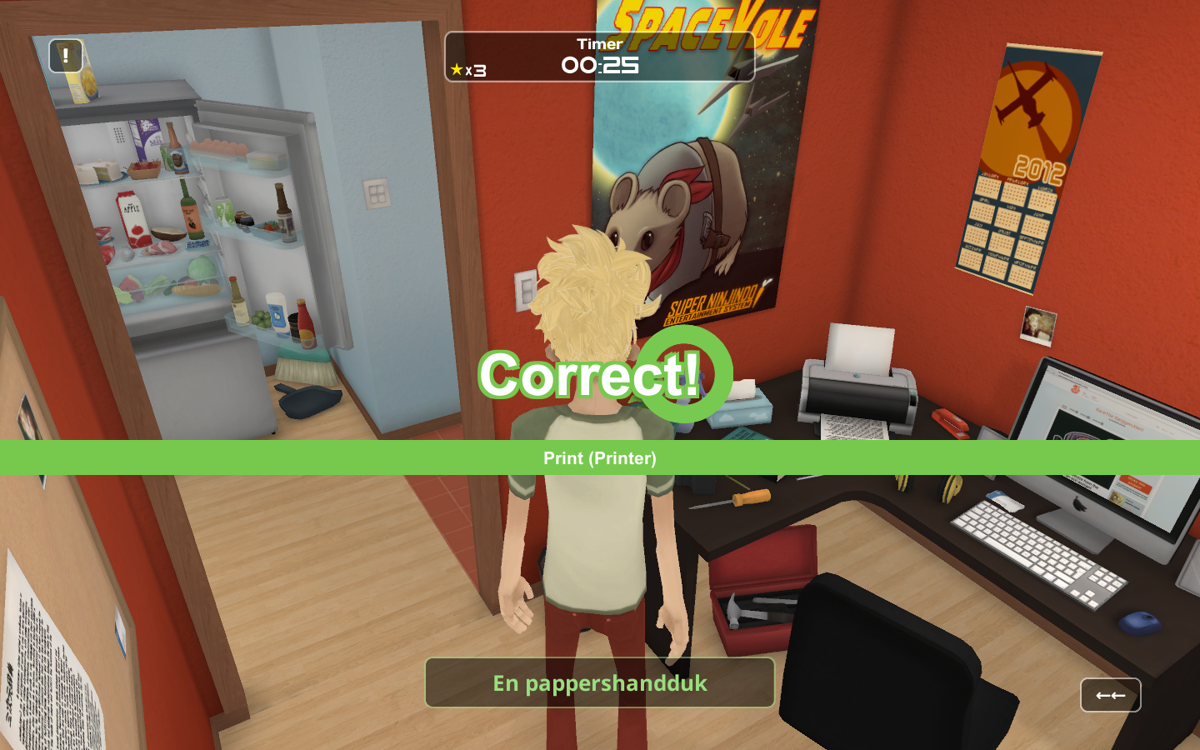“Influent” is a vocabulary-building language learning game developed by the University of Tsukuba’s Entertainment Computing Laboratory, led by game designer Rob Howland. “Influent” is a digital vocabulary trainer that’s framed as a point-and-click exploration game. Players control Andrew Cross, a character in a virtual apartment, and click on various objects to hear their names, see the written form, and practice pronunciation.

While many language learning tools focus on structured lessons and repetitive memorization, “Influent” differentiates itself by making vocabulary learning more interactive and exploratory. The game’s setup is simple: players navigate a 3D environment and click on objects to learn their names in the target language. This mechanic might sound straightforward, but it’s a deliberate design choice that creates a unique way for learners to engage with new words in context.
“Influent” utilizes simulation play as its primary mode of engagement. The game recreates a realistic apartment environment where players explore and interact with various objects, such as kitchen utensils, books, and furniture. Each item can be clicked to reveal its name and pronunciation in the target language, simulating how a learner might naturally encounter and label these objects in real life. This immersive approach allows players to connect vocabulary with real-world contexts, making the learning experience more meaningful. By using a simulated environment, “Influent” encourages learners to actively associate words with their everyday surroundings, providing a more practical application than traditional language learning methods that often present vocabulary in isolation. This makes the game particularly effective for those who benefit from experiential learning, where understanding is built through direct interaction rather than passive memorization.
Applying the MDAO Framework
Mechanics
The primary mechanic involves clicking on items to reveal and hear the word in the target language. A secondary mechanic includes building a personalized vocabulary list that can be reviewed later. The simplicity of the interaction mechanics ensures that learners remain focused on the language content, without unnecessary distractions.
Dynamics
Players decide where to explore, which objects to learn first, and when to revisit or test their knowledge. This creates a self-directed learning flow, driven by the player’s curiosity. The ability to set their own learning path turns every click into a decision that shapes their language experience, making it highly personalized.
Aesthetics
The visuals are designed to be clean and functional, with a minimalist style that keeps the focus on the objects and the vocabulary rather than overwhelming the learner with too many visual details. Sound is equally essential—the clear pronunciation of words reinforces learning, and optional background music provides a calming atmosphere without overpowering the educational content.
Outcomes
The expected outcome of “Influent” is to help learners expand their vocabulary through repeated exposure and contextual use. Unlike traditional flashcards, where words are presented in isolation, “Influent” embeds vocabulary in a relatable environment, making it easier for learners to remember and connect words to real-life situations.
Limitations of the App from an English Teacher’s Perspective
I used to be an English teacher for 10 years, and the game fails to address the main challenges for language learners-to communicate in the foreign language. “Influent” lacks contextual depth, which makes it feel more like a digital version of sticking labels on everything in your home. While it does introduce some phrases like “open the red drawer,” allowing players to learn verbs and adjectives alongside nouns, the game doesn’t provide any grammatical context or structured language rules. This means that while you can pick up individual words and simple phrases, you won’t develop the ability to form full sentences or understand complex structures. Another issue is that many of the objects found in the virtual apartment are low-frequency nouns that aren’t necessarily useful in everyday conversations. This focus on vocabulary that’s more relevant to household environments can limit the game’s applicability to real-world scenarios, even though the occasional high-frequency verb or adjective may still be helpful. As a result, “Influent” is more effective as a supplementary tool for vocabulary building than as a standalone language learning solution.






